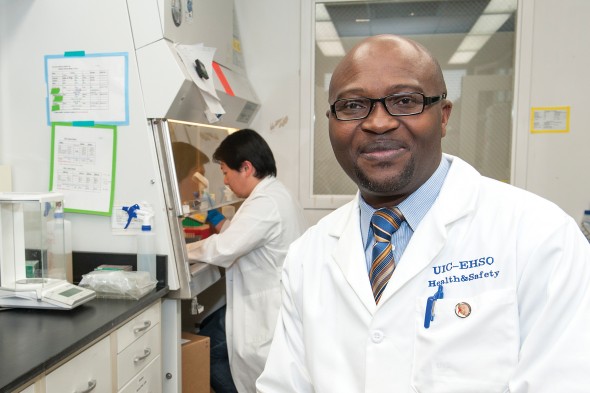Biological hazard specialist makes the world a safer place

Leo Njongmeta, senior biological safety specialist in the Environmental Health and Safety Office, is a mentor in the International Biological Threat Reduction Program.
Leo Njongmeta is helping make the world safer from deadly pathogens by spreading his expertise to developing countries.
A senior biological safety specialist in the Environmental Health and Safety Office, he’s a mentor in the International Biological Threat Reduction Program at Sandia National Laboratories, based in Albuquerque, New Mexico.
“Sandia Labs is one of the institutions that gets funds from the U.S. State Department to execute global bio-risk management programs,” Njongmeta said.
“Sandia Labs trains the trainers. They recruit experienced U.S.-based biosafety professionals to partner with safety professionals in developing countries.
“The goal is to reduce risk to research personnel and the environment from biological infectious agents.”
He’s one of six Americans in the program. There are two from Colorado State University and one each from Yale, the University of Minnesota and the U.S. Army Medical Research Institute for Infectious Diseases in Maryland. All attended an orientation meeting Jan. 16-22 in Sharm el-Sheikh, Egypt.
Njongmeta was paired with a safety professional from Morocco, and the others with their opposite numbers from Egypt, Yemen, Jordan and Algeria.
“We mentor on what infectious agents they would handle, identify the risk of people getting exposed, and devise safety programs so they could work with the hazards and not get hurt or allow the hazards to escape into the environment,” he said.
The scenarios they considered included accidents involving a pathogen like rabies virus, anthrax or HIV, released through poor safety practices or malfunctioning equipment.
In what Njongmeta called the worst-case scenario, someone could steal an infectious agent for use with malicious intent. Such agents can be legitimately acquired only for research purposes.
“Without going through proper channels, it raises a red flag,” he said.
More on security: those working with U.S. government-regulated infectious agents must be checked for trustworthiness, reliability and credibility. Key cards must be swiped to get into high-risk labs. Security cameras must be maintained.
Emergency response plans are essential to deal with crises ranging from a needle stick to a fire to a tornado.
“We have these in place here,” Njongmeta said. “But in most of these developing countries, the plans are just not there.”
He will stay in touch with his Moroccan counterpart via Skype, phone and email.
“At some point he might come over here and see how the biosafety program is run at UIC,” Njongmeta said. “There is also the possibility of me going out there to train them in an emergency response plan we are developing for them.”
At UIC, he does risk assessments for research facilities on biological agents ranging from salmonella to HIV to TB.
“For those working with potentially infectious biological materials, I look at the risks and make recommendations on best safety practices and controls to protect these researchers,” he said.
With a background of 15 years in infectious disease research, “I leverage my experience to be able to make risk assessments as well as provide the necessary safety training.”
Work with biological agents is highly regulated and Njongmeta makes sure research at UIC complies with requirements of government and funding agencies.
He was involved in the Ebola crisis training of health care workers in the use of personal protective equipment and management of wastes generated in treating a potential Ebola patient.
“The plan is to safely and securely transport the wastes to a site to be rendered inactive by autoclaving, to make sure any infectious agent gets killed before disposal,” he said.
Njongmeta, who joined UIC in 2011, grew up in the West African nation of Cameroon. He earned a bachelor of science with honors from Obafemi Awolowo University Ile-Ife in Nigeria, a master’s degree from University of Ibadan, Nigeria, and a Ph.D. from the University of Liverpool, England.
He enjoys playing soccer, dancing (favorite music ranges from Afro beats to Latin rhythms and Makossa music from Cameroon) and learning about other cultures.
The father of two Boy Scouts — Ndallah, 15, and Maema, 14 — he’s an assistant scoutmaster, active in the men’s group at his church and a Community Emergency Response Team member for Buffalo Grove.
His wife, Nenge, has a Ph.D. in food science and technology; she’s a business quality leader at Kraft Foods. They live in Buffalo Grove.
